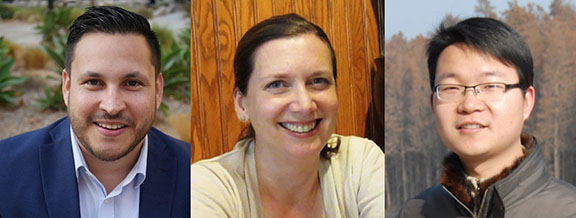
Computer science and medieval art history may not seem like an obvious pairing, but both fields are represented by the diverse group of four UCLA early career researchers who were recently awarded the inaugural Institute for Digital Research and Education (IDRE) Postdoctoral Fellowships.
The IDRE fellowship program was initiated as a mechanism to build a cohort of UCLA postdoctoral scholars and early career researchers and engage them in the IDRE community. Fellowship applicants were nominated by faculty sponsors and the recipients were selected by faculty from IDRE’s Executive Committee.
“The creative use of advanced cyberinfrastructure is interdisciplinary by nature”, said Warren Mori, director of IDRE. “The enthusiasm and talent of post-doctoral scholars with broad interests across campus are critical to the success of a diverse set of digitally enabled research projects. We hope this program will provide a vehicle for these scholars to share experiences, to work together, and to seed new campus collaborations.”
The UCLA IDRE postdoctoral fellows are: Dr. Nikhil Admal, Materials Science and Engineering; Dr. Omar Asensio, Anderson School of Management Ziman Center; Dr. Zhenman Fang, Computer Science; and Dr. Kristine Tanton, Art History. Their funded project proposals are as diverse as their backgrounds.
“I think we ended with four fellows that represent a broad mix of campus research,” said Lisa M. Snyder, director of campus research initiatives for UCLA’s Office of Information Technology and IDRE, and manager of IDRE’s GIS, Visualization and Modeling team.
Omar Asensio’s research as a postdoctoral scholar at the UCLA Center for Corporate Environmental Performance focuses on energy, health and sustainability. As an IDRE fellow, Asensio is working with Professor Magali Delmas of the UCLA Anderson School of Management’s Institute of the Environment and Sustainability to study charging behavior in electric vehicle (EV) networks.
In the fellowship application, Delmas said that electrification of passenger vehicles has the capacity to reduce carbon emissions by as much as between 35 and 57 percent, however, a hindrance to electric vehicle adoption has been driver anxiety about the use of electric vehicles due to cost concerns and logistics of charging their vehicles.
“Often, drivers don’t know where, when, or how much it will cost to charge their car,” she said in the proposal.
Using data provided by PlugShare, the world’s largest and most widely used EV charge station locator app, Delmas said they plan to study the impact of innovations like real-time information about charging station availability and characteristics, and the convenience of mobile electronic payment on electric vehicles usage.
“It has taken a generation, but it is now possible to find a high density of EV charging stations where we live, where we work, where we shop and points along the way.” Asensio said. “We also have mobile apps, which allow us to easily find charging stations and feel even more connected than ever before. These developments have huge implications for business and entrepreneurial activity and it is an exciting time for research on EV infrastructure, particularly with high frequency data.”
Fellow Kristine Tanton earned her Ph.D. in medieval art history. As a fellow, she is continuing her work as research project manager on Paris, Past and Present, a web-based humanities research and teaching project that is creating an archeologically accurate, three-dimensional digital reconstruction of the lost monuments of medieval Paris on an interactive map. Tanton’s faculty mentor, Professor Meredith Cohen of the Art History Department, began the project.
“The fellowship allows me to be part of a multidisciplinary scholarly community,” she said. “I am especially interested in exploring how online virtual worlds and user interaction may enrich the Paris project.”
The Paris project’s pedagogical component is through Cohen’s collaborative, project-based undergraduate course “Digital Gothic.” The course involves its students in the production of the digital models through putting to work the information they learn in the classroom about Gothic building practices and architectural history. Students create the models using a CAD-based architectural program.
Zhenman Fang is a postdoctoral scholar in the Computer Science Department working with Professor Jason Cong. Fang is researching how new computer architectures can impact DNA sequencing technology. He said that just 15 years ago the cost to complete one DNA sequence was around $100 million, but as the technology has improved over the years, costs have plummeted to a few thousand dollars. Fang is researching how to greatly reduce the time it takes to do DNA sequencing through the use of advanced computing platforms. He said that the whole process currently takes around a week, but he hopes that the new computing methods will reduce the process to a few hours.
Fang described the project as having a broad impact on a variety of areas. He said one specific benefit of speeding up DNA sequencing technology would be to better understand fast mutating diseases such as breast cancer.
Nikhil Admal’s work aims to improve the efficiency of power plants through research on the construction of a computational model of the phenomenon of recrystallization. Recrystallization is the reconfiguration of a material’s internal microstructure as a consequence of operation at high temperature and/or stress.
His fellowship proposal was submitted by Professor Jaime Marian of the Materials Science and Engineering Department. Admal has been working with the Marian Group at UCLA, which “focuses on understanding materials evolution under extreme conditions using multiscale computational modeling,” since October 2014.
All four IDRE fellows will be giving presentations on their research to the public that are intended to be of interest to researchers in a wide variety of disciplines who are thinking about innovative uses of tools and technology.
- Wednesday, February 8
Omar Asensio
- Wednesday, March 8
Nikhil Admal
- Wednesday, April 12
Zhenman Fang
- Wednesday, May 10
Kristine Tanton
The presentations will be held from 11:45 am to 1 pm in the IDRE Portal, Math Sciences 5628.
